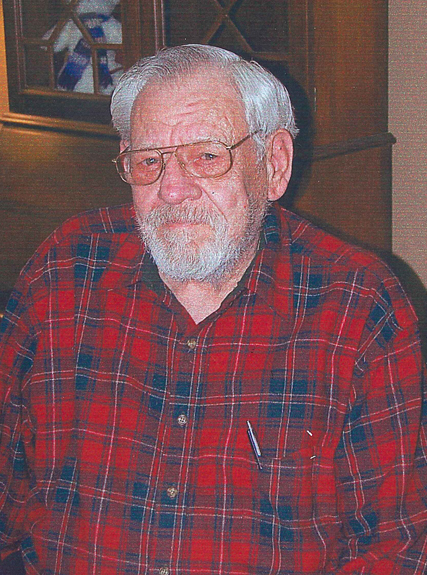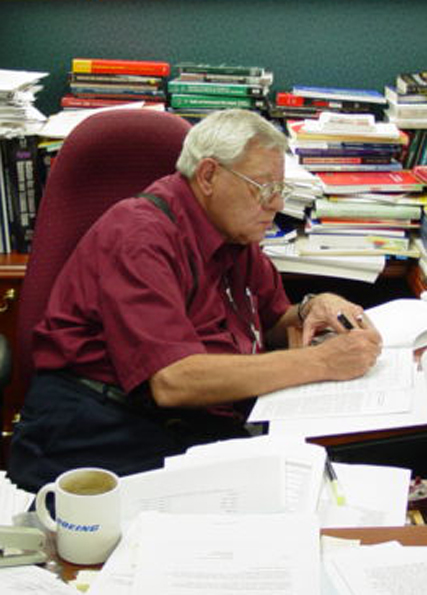In Memoriam: Gordon M. Lodde
1933-2014
by Robert Cherry, CHP


Gordon M. Lodde, Lieutenant Colonel, U.S. Army (retired), passed away at Brakebill Nursing Home, Knoxville, Tennessee, on 20 October 2014, at the age of 81. He was an exemplary soldier, citizen, and radiation protection professional.
Born on 19 August 1933, Gordon grew up in Lafayette, Indiana, and graduated from Trinity High School. He received a BS (chemistry and biology) degree from Purdue University in 1958 and he received an MS (radiobiology and health physics) degree from the University of Rochester in 1964.
After participating in the Army Reserve Officer Training Corps, Gordon received a commission as a second lieutenant in the U.S. Army Medical Service Corps in 1959. His first assignment was to Korea. While at Walter Reed Army Medical Center in the 1960s, he was in charge of radiation safety at two Army research reactors. In 1979, after 20 years of service, he retired as chief of the Health Physics Branch, U.S. Army Environmental Hygiene Agency at Aberdeen Proving Ground, Maryland.
During his service, he was the primary author of several Army and Army Medical Department regulations and guidance documents that remained in effect for many years after he retired from the Army. The Army still uses many of his guidance documents with few changes. He was a major contributor to "Depleted Uranium Aerosol Doses and Risk: Summary of U.S. Assessments," "Human Health Risk Assessment of Capstone Depleted Uranium Aerosols," and "Depleted Uranium—Human Exposure Assessment and Health Risk Characterization in Support of the Environmental Exposure Report Readiness and Military Deployments." He contributed numerous other publications and presentations over his career. Over the course of his Army service, his awards included the Army Commendation Medal with two oak-leaf clusters and the Legion of Merit.
After retiring from the Army, he continued working as a health physics consultant from 1979 to 2006. Organizations that he worked for included Porter Consultants, GPU Nuclear, Battelle, Federal Emergency Management Agency, U.S. Army Center for Health Promotion and Medicine, and various private contractors. Gordon was a contributing author for two publications: Handbook for Management of Radiation Protection Programs in 1992 and the fourth edition of the International Labour Organisation Encyclopaedia of Occupational Health and Safety ("Workplace Design for Radiation Safety") in 1997. Additionally, he served on several American National Standards Institute committees, where he wrote standards for radiation protection.
He was an avid, adult leader for the Boy Scouts of America (BSA) from 1967 through 1983. He held virtually every voluntary adult unit position in the Cub Scouts, Boy Scouts, and Explorers. Additionally, he held positions at the district and council levels. The Baltimore Area Council awarded him the District Merit Award in 1976 and the Silver Beaver Award in 1978.
Gordon provided service to the Health Physics Society (HPS) and to the radiation protection profession for more than 40 years. He first joined the Society in 1963 and became a fellow in 2007. John Villforth wrote in support of Gordon's nomination for HPS fellow, "I have a lot of respect for Gordon's integrity and [for Gordon] as a long time HP [health physics] leader and one who has brought credibility to the Army's HP programs and to the aftermath of TMI [Three Mile Island]." He was an active member of the HPS Baltimore-Washington Chapter (since 1965), the HPS Susquehanna Valley Chapter (since 1986 and a past president), the HPS Delaware Valley Society for Radiological Safety (since 1984), the American Nuclear Society (since 1990), the American Conference of Governmental Industrial Hygienists (since 1968), and the American Industrial Hygiene Association (since 1968).
Colonel (retired) Lew Pitchford, Gordon's colleague and contemporary, provided some insights on Gordon for this tribute:
"Lodde was an expert innovator. A new situation was an exciting challenge to enjoy, developing a new device or procedure that would effectively solve an unusual or unique problem. As an official inspector, he was unusually thorough in finding flaws in any program, but he used the opportunity to teach proper health physics procedures, better, more efficient or more effective ways to implement rules and regulations. He was a friendly expert consultant, more than an outside inspector would have been. His diverse personality included sincere empathy for anyone needing help. He maintained a large rose garden with numerous unusual species."
This is how I remember Gordon: He was my first mentor and example of what a health physicist should be. He taught me a great deal about what he and the Army expected from me as a military health physicist and about what I needed to learn as I entered my new profession. He escorted me to my first Baltimore-Washington Chapter meeting, and he encouraged and supported my efforts to become American Board of Health Physics certified. I am positive that his lasting effect on my military health physics career has happened with other junior officers and new civilians many times before and after I first met him in 1977. He has been an inspiration to and leader of numerous young Army health physicists and continued doing so as long as he could. He had a health physics reference in his cluttered office library (see photograph) for every occasion and he was always glad to share it. He tried to appear gruff, but everyone could see through that. I miss him a lot, and I am not the only one who does.
Gordon was preceded in death by Nancy Jean (Caldwell) Lodde, his wife of 50 years, and by Herman M. and Eva Grace (Robinson) Lodde, his parents. He is survived by two sons and a daughter: Gordon A. Lodde of Lancaster, Pennsylvania, Bruce C. Lodde of Sweetser, Indiana, and Melissa J. (Lodde) Cox of Knoxville, Tennessee. He also has two granddaughters: Kezia A. Cox and Katy J. (Cox) and Jesse McCallon of Knoxville, Tennessee.



